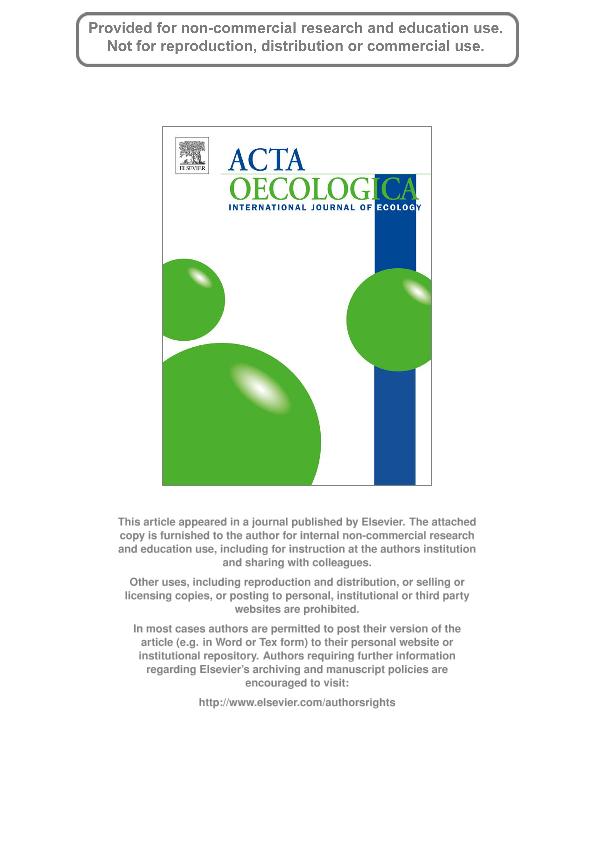Mostrar el registro sencillo del ítem
dc.contributor.author
Pelegrin, Nicolas

dc.contributor.author
Chani, Jose Maria

dc.contributor.author
Echevarria, A. L.
dc.contributor.author
Bucher, Enrique Hugo

dc.date.available
2015-07-23T13:01:56Z
dc.date.issued
2013-06
dc.identifier.citation
Pelegrin, Nicolas; Chani, Jose Maria; Echevarria, A. L.; Bucher, Enrique Hugo; Habitat degradation may affect niche segregation patterns in lizards; Gauthier-Villars/Editions Elsevier; Acta Oecologica; 51; 6-2013; 82-87
dc.identifier.issn
1146-609X
dc.identifier.uri
http://hdl.handle.net/11336/1418
dc.description.abstract
Lizards partition resources in three main niche dimensions: time, space and food. Activity time and microhabitat use are strongly influenced by thermal environment, and may differ between species according to thermal requirements and tolerance. As thermal characteristics are influenced by habitat structure, microhabitat use and activity of lizards can change in disturbed habitats. We compared activity and microhabitat use of two abundant lizard species of the Semi-arid Chaco of Argentina between a restored and a highly degraded Chaco forest, to determine how habitat degradation affects lizard segregation in time and space, hypothesizing that as activity and microhabitat use of lizards are related to habitat structure, activity and microhabitat use of individual species can be altered in degraded habitats, thus changing segregation patterns between them. Activity changed from an overlapped pattern in a restored forest to a segregated pattern in a degraded forest. A similar trend was observed for microhabitat use, although to a less extent. No correlation was found between air temperature and lizard activity, but lizard activity varied along the day and among sites. Contrary to what was believed, activity patterns of neotropical diurnal lizards are not fixed, but affected by multiple factors related to habitat structure and possibly to interspecific interactions. Changes in activity patterns and microhabitat use in degraded forests may have important implications when analyzing the effects of climate change on lizard species, due to synergistic effects.
dc.format
application/pdf
dc.language.iso
eng
dc.publisher
Gauthier-Villars/Editions Elsevier

dc.rights
info:eu-repo/semantics/openAccess
dc.rights.uri
https://creativecommons.org/licenses/by-nc-sa/2.5/ar/
dc.subject
CHACO FOREST
dc.subject
LIOLAEMUS CHACOENSIS
dc.subject
NICHE SEGREGATION
dc.subject
REPTILES
dc.subject
RESOURCE PARTITIONING
dc.subject
TEIUS TEYOU
dc.subject.classification
Conservación de la Biodiversidad

dc.subject.classification
Ciencias Biológicas

dc.subject.classification
CIENCIAS NATURALES Y EXACTAS

dc.subject.classification
Ecología

dc.subject.classification
Ciencias Biológicas

dc.subject.classification
CIENCIAS NATURALES Y EXACTAS

dc.title
Habitat degradation may affect niche segregation patterns in lizards
dc.type
info:eu-repo/semantics/article
dc.type
info:ar-repo/semantics/artículo
dc.type
info:eu-repo/semantics/publishedVersion
dc.date.updated
2016-03-30 10:35:44.97925-03
dc.journal.volume
51
dc.journal.pagination
82-87
dc.journal.pais
Francia

dc.journal.ciudad
Paris
dc.description.fil
Fil: Pelegrin, Nicolas. Consejo Nacional de Investigaciones Científicas y Técnicas. Centro Científico Tecnológico Conicet - Córdoba. Instituto de Diversidad y Ecología Animal. Universidad Nacional de Córdoba. Facultad de Ciencias Exactas Físicas y Naturales. Instituto de Diversidad y Ecología Animal; Argentina
dc.description.fil
Fil: Chani, Jose Maria. Universidad Nacional de Chilecito; Argentina
dc.description.fil
Fil: Echevarria, A. L.. Fundación Miguel Lillo; Argentina
dc.description.fil
Fil: Bucher, Enrique Hugo. Consejo Nacional de Investigaciones Científicas y Técnicas. Centro Científico Tecnológico Conicet - Córdoba. Instituto de Diversidad y Ecología Animal. Universidad Nacional de Córdoba. Facultad de Ciencias Exactas Físicas y Naturales. Instituto de Diversidad y Ecología Animal; Argentina
dc.journal.title
Acta Oecologica

dc.relation.alternativeid
info:eu-repo/semantics/altIdentifier/doi/http://dx.doi.org/10.1016/j.actao.2013.06.006
Archivos asociados
